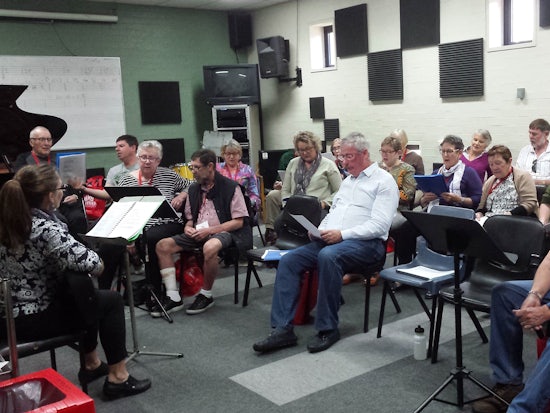Singers use power of song to Beat Parkinson’s
Researchers at Griffith University’s Queensland Conservatorium Research Centre are hoping to reduce the effects of Parkinson’s on patients across the Asia Pacific region with the introduction of UK model ‘Sing to Beat Parkinson’s’.

People are sining to beat Parkinson’s (Source: Queensland Conservatorium Research Centre)
The six month long study is nearing it’s end in late November, and although no findings or results have been finalised, Professor Don Stewart from Griffith Health’s School of Medicine says there have been a number of clear benefits to the program here in Australia.
Using three groups across Kallangur, Toowoomba and South Bank with close to 100 participants, the program incorporates singing, breathing and movement to engage with people living with Parkinson’s their family and carers, and to improve their quality of life.
“The participants come along on a weekly basis for an hour or so to enjoy singing together,” he says.
“We have taken the UK concept and invested funds in it to investigate the differences it makes to the lives of those living with Parkinson’s and their carers.
“We have been running the project for almost 6 months and are very interested to see the benefits that have occurred.”
While the researchers are looking at the benefits of the singing groups, Professor Stewart says they are not looking for a cure.
“We are looking at how we can assist people’s quality of life, feelings of wellbeing, socialisation and engagement with the community,” he says.
“Quite often people with Parkinson’s can feel isolated and have difficulty in getting out and about.
“We haven’t got the research results yet as we are not finished the study, but just through our observations and communication with participants there is a high level of enjoyment among participants who say they look forward to the sessions and that it is a big highlight of their week.”
After the testing finishes in November, Professor Stewart says the researchers will be collecting a second round of data to analyse for more concrete insight into how participating in the choir is helping participants and in what areas.
With much of the research work involving lots of organising and writing, he adds that the process can be at times a little ‘dry’ but with this particular study, he says seeing the group singing is ‘very cathartic’.
“People who have had difficulty communicating for years are able to participate and enjoy singing,” he says.
“It’s a completely uplifting experience.”
Parallel projects have also been run in Beijing, China and Seoul, Korea as part of an international project, which will be brought together with the Australian study in February 2018 for an International Workshop Symposium.
The symposium will report on the results, inviting experts in the field to sit on a panel and discuss Parkinson’s and the benefits of the singing groups.
“On one of the days as part of the symposium, we will be inviting all the choirs together and they will give a concert,” Professor Stewart says.
“At first our choir members were all shocked as they didn’t know about it but now they are all mustard keen.”
As well as enthusiasm for the initiative’s continuation by participants, Professor Stewart says he hopes more people and groups will come forward and want to run their own choirs.
“We want the groups to grow and continue,” he says.
“We can give them the pattern and give them ideas to set it all up and educate them on what exercises to do that won’t harm the participants.
“We are looking forward to the idea expanding and hopefully continuing on a national platform.”























